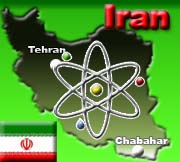Iran, EU coordinate next round of nuclear talks
 Tehran - Iran and the European Union have coordinated in a telephone call the next round of nuclear talks, the ISNA news agency reported Thursday.
Tehran - Iran and the European Union have coordinated in a telephone call the next round of nuclear talks, the ISNA news agency reported Thursday.
Iran's chief nuclear negotiator Saeid Jalili and EU foreign policy chief Javier Solana had a telephone conversation following Iran's announcement it was ready to resume nuclear talks with world powers on Wednesday.
Solana is representing the so-called 5+1 group which includes the five permanent UN Security Council member states - the United States, Russia, China, Britain and France - plus Germany.
Jalili said he hoped the new round of talks would be held in an atmosphere of respect and fairness and eventually lead to progress.
Solana was quoted as sayinb by ISNA he also hoped for a "constructive and fruitful" round of talks.
The date and venue of the next round of talks, in which the United States was to take part directly for the first time, have not been fixed yet. The US took part in the talks once last year as an observer.
Despite the readiness of both sides for resuming talks, Iran once again stressed that it would continue its controversial uranium enrichment programme which it regards as within the framework of the Nuclear Non-Proliferation Treaty.
Enriched uranium is a basis for nuclear fuel, but if enriched to a higher degree, it can also be used to make nuclear weapons.
Suspension of uranium enrichment is the main demand by the world powers, but Tehran insists it will never accede this demand.
The talks, which ground to a halt last year, revolve around fears by the international community that Iran is seeking nuclear weapons capability. Iran maintains its programme is purely for producing energy.
Iranian President Mahmoud Ahmadinejad had earlier said he had a new package for the 5+1 powers including proposals which would guarantee peace, justice, respect and cooperation throughout the world. He gave no further details.
The Iranian package is expected to include not only issues related to Iran's nuclear programme but also the Middle East crisis, including condemnation of Israeli policies in the Palestinian territories, and therefore most likely not lead to any breakthrough in the nuclear deadlock. (dpa)